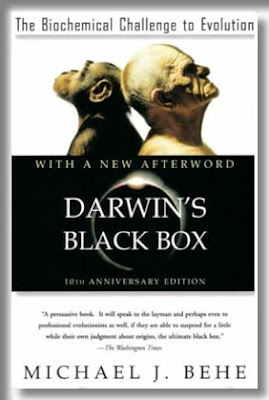 Michael Behe’s book: Darwin’s Black Box, a Biochemical Challenge to Evolution, is one book among many that I have been meaning to read over the years, knowing that it is an important work and yet I have managed to justify a fairly long delay in doing so. In fact, of the people that I know who have this book in their library, almost all of them admit that they want to read it at some point, and yet they too have been slow to do so because of other reading priorities. I’m not sure if this is the case, but it seems that while most Christians are interested in the evolution/intelligent design argument, perhaps most of us are caught up with other questions, issues, and battles that challenge the church in the modern day. But having read this work myself (finally) I would kindly recommend that you do the same as well. The main reason is this: Michael Behe has delivered an important argument for intelligent design that places yet another dagger deep into the heart of Darwinism.
Michael Behe’s book: Darwin’s Black Box, a Biochemical Challenge to Evolution, is one book among many that I have been meaning to read over the years, knowing that it is an important work and yet I have managed to justify a fairly long delay in doing so. In fact, of the people that I know who have this book in their library, almost all of them admit that they want to read it at some point, and yet they too have been slow to do so because of other reading priorities. I’m not sure if this is the case, but it seems that while most Christians are interested in the evolution/intelligent design argument, perhaps most of us are caught up with other questions, issues, and battles that challenge the church in the modern day. But having read this work myself (finally) I would kindly recommend that you do the same as well. The main reason is this: Michael Behe has delivered an important argument for intelligent design that places yet another dagger deep into the heart of Darwinism.
Behe is professor of biochemistry at Lehigh University in Pennsylvania and a senior fellow of the Discovery Institute’s Center for Science and Culture, and it is quite clear that he writes from the pedigree of his academic background. It is important to note that Behe’s opposition to Evolution is not based upon Scriptural grounds; instead, it is based upon the question of scientific data alone. Therefore I would caution and remind the reader that this is not a biblical defense of creationism, instead it is a secular/scientific critique of Darwinism. In brief, Behe’s key argument can be reduced to the two words that now appear in almost all books dealing with Darwinism, whether pro or con: irreducible complexity. Behe takes the reader into the microcosm of the biochemical machines that are utilized in living cells, and shows us that these irreducibly complex structures have no logical precursor from which they could possibly evolve. To illustrate his point, Behe repeatedly uses the analogy of a basic mouse trap. A mouse trap (like the biochemical machines in cells) is irreducibly complex – meaning that if any component of the mouse trap were removed (the wooden base, spring, hammer, latch or trigger) then no functional trap would exist. Such non-functionality is a contradiction to the essential expectation of evolutionary theory. Evolution is believed to occur because changes/mutations are beneficial to the living organism, therefore a non-beneficial precursor is simply not a Darwinian option. Behe uses a number of biochemical systems in order to make his point, not the least of which are the cilium or flagellum, whose irreducible complexities reveal that Darwinism is not the product of empirical science; instead it is no more than a theoretical hypothesis; a philosophical hopeful monster if you’ll pardon the science-pun. As stated earlier, Darwin’s Black Box is an important read because it has had an important impact on the whole debate surrounding Darwinism. Frankly, it is difficult to find a book on Evolution, or Creationism, that doesn’t address the subject of irreducible complexity any more. And for those who aren’t interested in the debate itself, this book still supplies many wonderful details which disclose God’s power and wisdom in creating and sustaining life. For believers, it can be a great source of edification.
Finally, Behe has done something in this book that isn’t particularly easy: he has made it so that it can be studied at different levels. For those who want to explore the biochemical details of his argument, they can proceed through texts that are marked out by Behe as being more technical in nature. Those who want to avoid the technical sections can still get the main argument of the book without the deeper layers of biochemical analysis. I would say that this is a must-read for those who desire to go more deeply into the apologetics of Creationism – even though Behe himself is not a young-earth Creationist.
